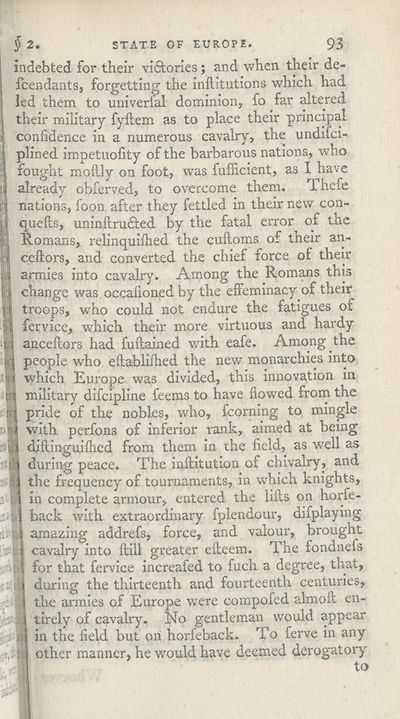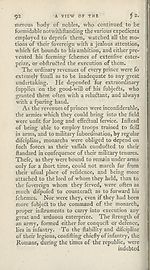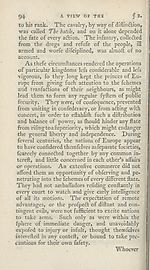Download files
Complete book:
Individual page:
Thumbnail gallery: Grid view | List view

$
2.
STATE OF EUROPE.
93
indebted for their victories; and when their de-
fcendants, forgetting the inftitutions which had
led them to univerfal dominion, fo far altered
their military fyftem as to place their principal
confidence in a numerous cavalry, the undifci-
plined impetuolity of the barbarous nations, who
fought moftly on foot, was fufficient, as I have
already obferved, to overcome them. i hefe
nations, foon after they fettled in their new con-
quefts, uninilructed by the fatal error of the
Romans, relinquiihed the cuftoms of their an-
ceftors, and converted the chief force of their
armies into cavalry. Among the Romans this
change was occaiioned by the effeminacy of their
troops, who could not endure the fatigues of
fervice, which their more virtuous and hardy
anceftors had fuftained with eafe. Among the
people who eftablilhed the new monarchies into
which Europe was divided, this innovation in
military difcipline feems to have flowed from the
pride of the nobles, who, fcorning to mingle
with perfons of inferior rank, aimed at being
diftinguiflicd from them in the field, as well as
during peace. The iuftitution of chivalry, and
the frequency of tournaments, in which knights,
in complete armour, entered the lifts on horfe-
back with extraordinary fplendour, difplaying
amazing addrefs, force, and valour, brought
cavalry into ftill greater efteem. The fondnefs
for that fervice increafed to fuch a degree, that,
during the thirteenth and fourteenth centuries,
the armies of Europe were compofed almoft en¬
tirely of cavalry. No gentleman would appear
in the field but on horfeback. To ferve in any
other manner, he would have deemed derogatory
to
2.
STATE OF EUROPE.
93
indebted for their victories; and when their de-
fcendants, forgetting the inftitutions which had
led them to univerfal dominion, fo far altered
their military fyftem as to place their principal
confidence in a numerous cavalry, the undifci-
plined impetuolity of the barbarous nations, who
fought moftly on foot, was fufficient, as I have
already obferved, to overcome them. i hefe
nations, foon after they fettled in their new con-
quefts, uninilructed by the fatal error of the
Romans, relinquiihed the cuftoms of their an-
ceftors, and converted the chief force of their
armies into cavalry. Among the Romans this
change was occaiioned by the effeminacy of their
troops, who could not endure the fatigues of
fervice, which their more virtuous and hardy
anceftors had fuftained with eafe. Among the
people who eftablilhed the new monarchies into
which Europe was divided, this innovation in
military difcipline feems to have flowed from the
pride of the nobles, who, fcorning to mingle
with perfons of inferior rank, aimed at being
diftinguiflicd from them in the field, as well as
during peace. The iuftitution of chivalry, and
the frequency of tournaments, in which knights,
in complete armour, entered the lifts on horfe-
back with extraordinary fplendour, difplaying
amazing addrefs, force, and valour, brought
cavalry into ftill greater efteem. The fondnefs
for that fervice increafed to fuch a degree, that,
during the thirteenth and fourteenth centuries,
the armies of Europe were compofed almoft en¬
tirely of cavalry. No gentleman would appear
in the field but on horfeback. To ferve in any
other manner, he would have deemed derogatory
to
Set display mode to:
![]() Universal Viewer |
Universal Viewer | ![]() Mirador |
Large image | Transcription
Mirador |
Large image | Transcription
| Antiquarian books of Scotland > Kings & rulers > History of the reign of the Emperor Charles V. > Volume 1 > (111) |
|---|
| Permanent URL | https://digital.nls.uk/109183663 |
|---|
| Description | By William Robertson. London : Cadell and Davies, 1798. |
|---|---|
| Shelfmark | ABS.1.76.13 |
| Additional NLS resources: | |
| Description | Thousands of printed books from the Antiquarian Books of Scotland collection which dates from 1641 to the 1980s. The collection consists of 14,800 books which were published in Scotland or have a Scottish connection, e.g. through the author, printer or owner. Subjects covered include sport, education, diseases, adventure, occupations, Jacobites, politics and religion. Among the 29 languages represented are English, Gaelic, Italian, French, Russian and Swedish. |
|---|

